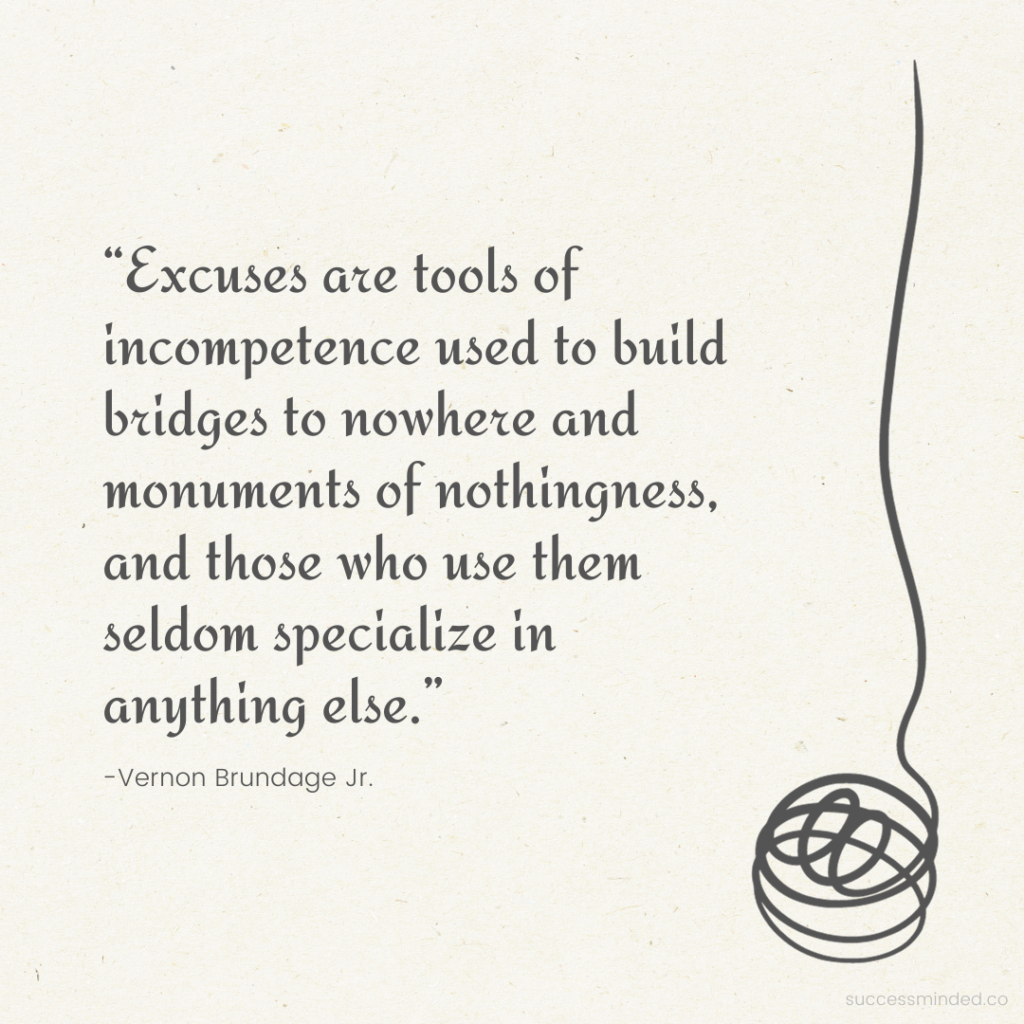
“Excuses are tools of incompetence used to build bridges to nowhere and monuments of nothingness, and those who use them seldom specialize in anything else.”
Vernon Brundage Jr.
“Excuses are tools of incompetence…” When I first read this opening line of the brutally honest poem quote, I flinched a bit. My mind reflexively sprang into problem-solving mode about responsibilities I had dropped the ball on recently due to busyness, conflicting priorities, or energy lacking. Surely, MY excuses stemmed from rational time and resource constraints not “incompetence” — or so my momentary defensiveness claimed.
But taking an honest personal inventory, I knew occasional explanations slipped into outright enabling patterns, allowing me to dodge uncomfortable growth edges or accountability. And in those instances, I couldn’t actually refute Brundage’s blunt assessment. Because at the end of the day, excuses — however convincingly framed — DO sabotage developing talents and skills essential to progress.
Let’s explore more about why excuses prove so detrimental to realizing meaningful goals so that we can break the tendency to hide behind them.
Meaning of the Poem
With vivid language about “monuments of nothingness” and “bridges to nowhere,” Brundage’s poem grasps how excuses ultimately construct flimsy illusions that prevent authentic human advancement. We pour staggering effort into crafting believable cover stories that spare us shame or hardship for incomplete efforts. But the integrity of this output gets questioned alongside any lasting benefits built through this energy expenditure if excuses chronically substitute for achievement.
At its core, Brundage’s poem reveals excuses as toxic traps trapping us because they falsely reassure us there exists some reasonable explanation for ongoing stagnation. Yet perpetually rationalizing lack of follow-through only deprives us of capabilities, character, and purpose forged THROUGH conquering adversity and uncertainty courageously.
Who Wrote the Poem “Excuses Are Tools of Incompetence”?
This poem was written by Vernon Brundage Jr.
About Vernon Brundage Jr.
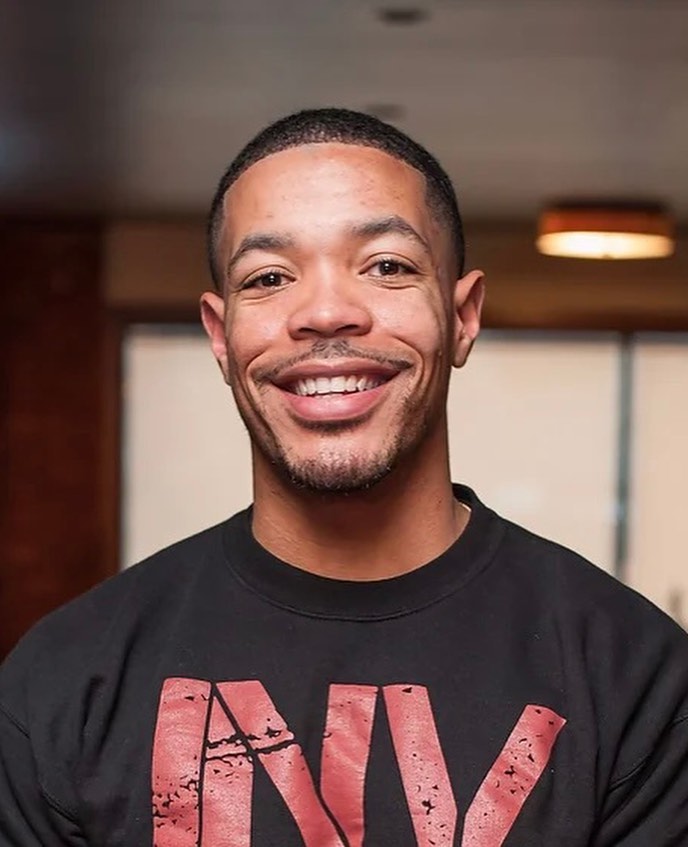
Vernon Brundage Jr. is a multifaceted individual deeply engaged with the millennial generation through his fresh and innovative approaches to motivation and inspiration. He has formal training in economics and works as an economist for the United States federal government. Brundage is also the founder and Executive Director of investED Enrichment Services, Inc., a nonprofit dedicated to serving at-risk youth in low-income communities.
Brundage’s literary contributions include his Amazon #1 bestselling book, “Shoot Your Shot: A Sport-Inspired Guide To Living Your Best Life,” published in October 2018. The book blends basketball principles with life lessons, aiming to help readers navigate their lives and achieve their dreams. He is also set to release his debut novel, “Beyond the Arc,” in October 2023.
Aside from his literary and economic pursuits, Vernon is an active public speaker, traveling across the country to inspire youth and young adults. He emphasizes the importance of transforming perceived failures into stepping stones for success.
Originally hailing from the Philadelphia, PA region, Vernon now resides in the Washington, DC metro area. His personal interests include basketball, reading, writing, fitness, travel, and spending quality time with loved ones.
Why Excuses Impede Growth
We’ve all encountered that common scenario of the aspiring writer who talks animatedly about the Great American Novel he is “this close” to finishing if only he had a bit more time. Yet he somehow finds hours to excessively doomscroll social media or immerse himself in his favorite shows.
Certainly, we all deserve periods of fun diversion! But at some point, chronic excuse-making around directing focus toward serious skill development begins to cripple any meaningful progress.
Maybe it stems from fear of investing effort, but ultimately failing, which ego convinces us, is worse than never having tried at all. But when we stop confronting fears or challenging comfort levels, we forfeit evolution.
Excuses grant us fleeting relief from leaving safe harbors. But meanwhile untapped talents and dreams slowly atrophy as excuse after excuse piles up amounting to those “monuments of nothingness.”
I distinctly recall early vocalizations in my career about desiring leadership trajectory roles down the line “when the timing is right.” Yet I conveniently always managed to find excuses on why NOW didn’t fit that criteria, allowing me to stagnate professionally. When eventually I ran out of comforting short-term rationales, I had no choice but to interrogate WHY I feared embracing more than I was willing to pursue boldly through uncertainty.
The Compounding Impact of Excuses
Not only do excuses provide convenient one-off stories postponing individual action, as my work example demonstrates. But left unchecked, they accumulate potentially detrimental IMPACTS. Each unfinished plan or abandoned effort cascades, perpetuating a lack of trust in our capabilities, making subsequent excuse-making easier.
Maybe initiating an uncomfortable money-related discussion with a partner gets repeatedly delayed to avoid conflict. But suppressing needs around financial security slowly devolves intimacy and trust within the relationship. Communicative silence excused by peace-keeping rationalizations breeds distance and secrecy, eroding connection over months.
Or perhaps we nurture stories that friends constantly initiate outings because we feel our suggestions bore them based on a couple polite declines. So, we slowly stop showing up fully within those friendships out of defeated assumptions. Before long, the excuses protecting our pride snowball into the very outcomes we sought to prevent.
Owning Your Path
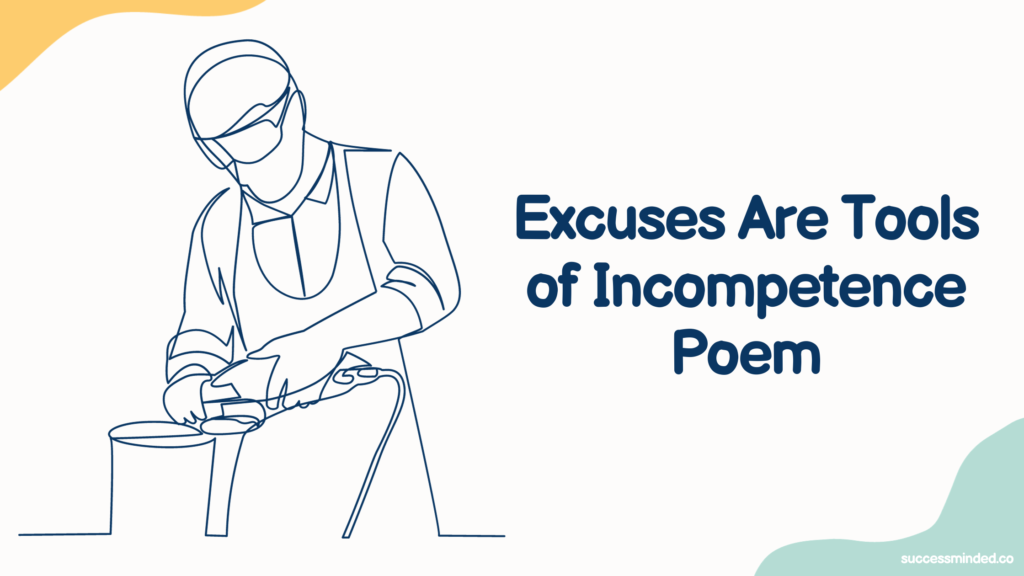
But the EMPOWERING piece of Brundage’s assertion remains that even if excuses temporarily reassure our egos, they DO spring from choice points we wield authority over! Their alluring grip stems solely from our buy-in. We CAN reclaim our path by refusing false narratives around inability.
Owning decisions without transfers of blame short-circuits urge to self-excuse. When we stand squarely within truth, saying, “I continue choosing inaction out of retreat, not due to external barriers,” motivational energy gets released.
Pride converts to self-trust through repeatedly confronting challenges daunting to our smaller selves. A few awkward money conversations or attempts at inviting friends to preferred activities ultimately forge more fulfillment than years of avoiding feared scenarios ever would!
Each day, we face a crossroads to either transcend comfortable patterns through purposeful EXPANDING effort or construct flimsy bridges going nowhere through excuses.
In the end, our human worth manifests through courageously beating wings of evolution not rationalizing fear-based inertia. Progress awaits beyond excuse-imposed illusions. We simply must dare to turn towards growth spanning beyond assumed limitations! The only variable involves OUR willingness to embrace a more empowered authorship of our stories.
Conclusion
In the journey of personal development, Vernon Brundage Jr.’s poem and the insights shared to remind us that growth lies beyond the veil of excuses. Embracing accountability and challenging ourselves to move past comfortable narratives paves the way for genuine progress and fulfillment.
As we author the stories of our lives, let’s choose courage over comfort, action over inertia, and transformation over stagnation. Here’s to building bridges to our aspirations, not monuments of nothingness.

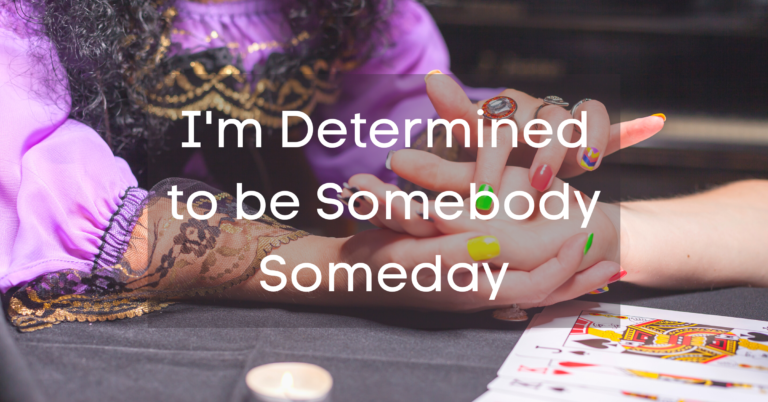
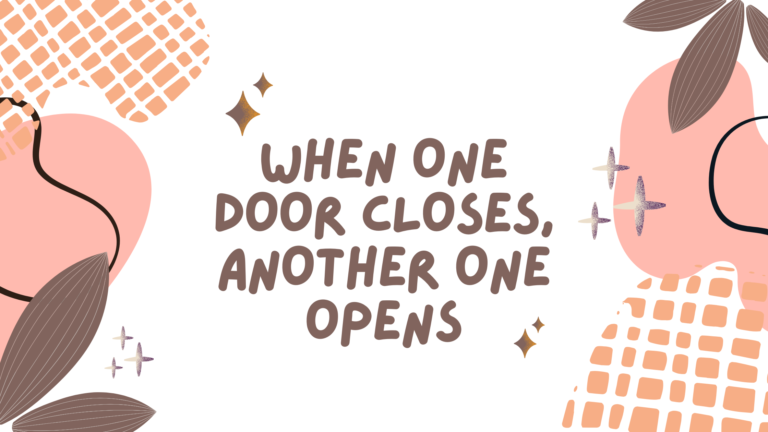
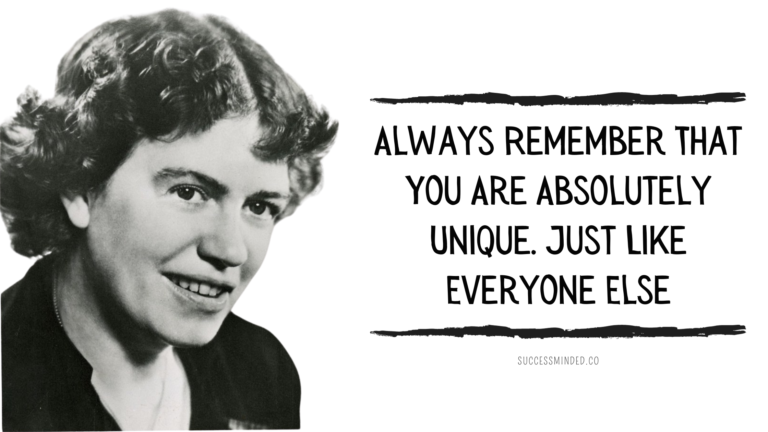
Excellent text and learnt many new things I used to do . Now I will correct myself .
Thanks a lot 🙏
I’ve been saying this for over 30 years. How could this guy be the author of this saying?
If he is claiming this, he is plagiarizing. I’ve been saying this for 43 years and many who came before me say it.
Kappa
Alpha
Psi